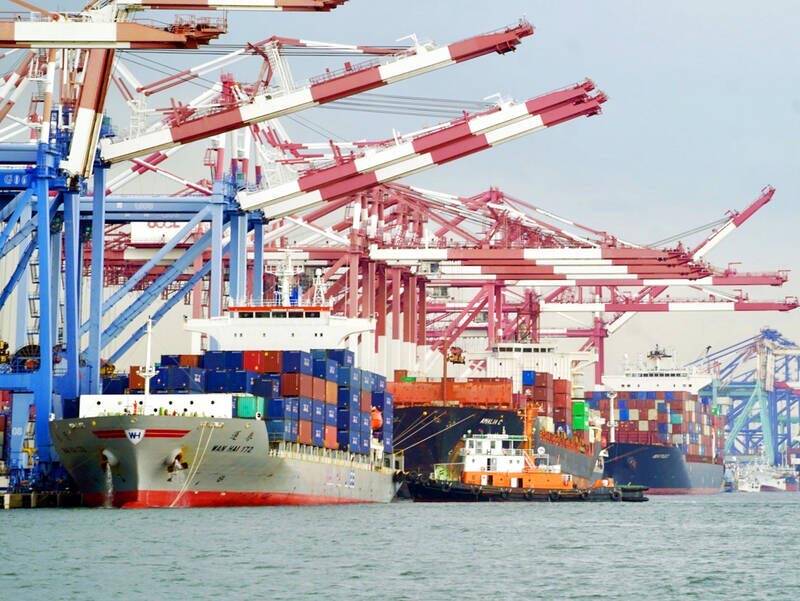China’s Ministry of Commerce yesterday announced that polycarbonate imported from Taiwan would be subject to anti-dumping duties starting today for a period of five years.
In a statement, the ministry confirmed its final determination on anti-dumping measures for imported polycarbonate originating from Taiwan.
Based on its investigation, the ministry concluded that dumping practices were causing harm to China’s polycarbonate industry.

Photo: CNA
According to Taiwan’s Customs Administration data, exports of polycarbonate to China last year amounted to about US$830 million, making it the largest market for Taiwan’s polycarbonate exports, accounting for about 78.5 percent of the total.
Polycarbonate was included as an item in the “early harvest” list of the Economic Cooperation Framework Agreement (ECFA) between Taiwan and China signed in 2010.
Academics have suggested the decision to impose anti-dumping duties on polycarbonate, a material used in various sectors including electronics, automotive, optics, packaging, medical devices and safety equipment, is part of China’s response to broader geopolitical tensions and pressures.
The anti-dumping investigation into imported polycarbonate from Taiwan was initiated by the Chinese Ministry of Commerce in November 2022, with preliminary findings released in August last year confirming dumping practices and substantial harm to China’s polycarbonate industry.
The interim anti-dumping duties imposed on Taiwanese polycarbonate were as high as 22.4 percent.
However, the investigation, originally scheduled to conclude on May 29, saw its final determination announced yesterday ahead of the inauguration of president-elect William Lai (賴清德) on May 20.
The announcement also outlined specific anti-dumping duties for Taiwanese companies, including Taiwan Chemical Fiber Corp (9 percent), Idemitsu Chemicals Taiwan Corp (9 percent), Chimei Corp (12.2 percent), Chi Lin Technology Co, Ltd (12.2 percent) and other Taiwanese entities (22.4 percent).
Taiwan’s Executive Yuan spokesman Lin Tzu-lun (林子論) said yesterday that China’s actions contribute nothing to normalizing cross-strait trade and are unfair toward Taiwanese businesses.
Lin urged China not to politically manipulate trade and to allow cross-strait commerce to return to international norms.
Additional reporting by Chung Li-hua

‘CHARM OFFENSIVE’: Beijing has been sending senior Chinese officials to Okinawa as part of efforts to influence public opinion against the US, the ‘Telegraph’ reported Beijing is believed to be sowing divisions in Japan’s Okinawa Prefecture to better facilitate an invasion of Taiwan, British newspaper the Telegraph reported on Saturday. Less than 750km from Taiwan, Okinawa hosts nearly 30,000 US troops who would likely “play a pivotal role should Beijing order the invasion of Taiwan,” it wrote. To prevent US intervention in an invasion, China is carrying out a “silent invasion” of Okinawa by stoking the flames of discontent among locals toward the US presence in the prefecture, it said. Beijing is also allegedly funding separatists in the region, including Chosuke Yara, the head of the Ryukyu Independence

UNITED: The premier said Trump’s tariff comments provided a great opportunity for the private and public sectors to come together to maintain the nation’s chip advantage The government is considering ways to assist the nation’s semiconductor industry or hosting collaborative projects with the private sector after US President Donald Trump threatened to impose a 100 percent tariff on chips exported to the US, Premier Cho Jung-tai (卓榮泰) said yesterday. Trump on Monday told Republican members of the US Congress about plans to impose sweeping tariffs on semiconductors, steel, aluminum, copper and pharmaceuticals “in the very near future.” “It’s time for the United States to return to the system that made us richer and more powerful than ever before,” Trump said at the Republican Issues Conference in Miami, Florida. “They

GOLDEN OPPORTUNITY: Taiwan must capitalize on the shock waves DeepSeek has sent through US markets to show it is a tech partner of Washington, a researcher said China’s reported breakthrough in artificial intelligence (AI) would prompt the US to seek a stronger alliance with Taiwan and Japan to secure its technological superiority, a Taiwanese researcher said yesterday. The launch of low-cost AI model DeepSeek (深度求索) on Monday sent US tech stocks tumbling, with chipmaker Nvidia Corp losing 16 percent of its value and the NASDAQ falling 612.46 points, or 3.07 percent, to close at 19,341.84 points. On the same day, the Philadelphia Stock Exchange Semiconductor Sector index dropped 488.7 points, or 9.15 percent, to close at 4,853.24 points. The launch of the Chinese chatbot proves that a competitor can

‘VERY SHALLOW’: The center of Saturday’s quake in Tainan’s Dongshan District hit at a depth of 7.7km, while yesterday’s in Nansai was at a depth of 8.1km, the CWA said Two magnitude 5.7 earthquakes that struck on Saturday night and yesterday morning were aftershocks triggered by a magnitude 6.4 quake on Tuesday last week, a seismologist said, adding that the epicenters of the aftershocks are moving westward. Saturday and yesterday’s earthquakes occurred as people were preparing for the Lunar New Year holiday this week. As of 10am yesterday, the Central Weather Administration (CWA) recorded 110 aftershocks from last week’s main earthquake, including six magnitude 5 to 6 quakes and 32 magnitude 4 to 5 tremors. Seventy-one of the earthquakes were smaller than magnitude 4. Thirty-one of the aftershocks were felt nationwide, while 79